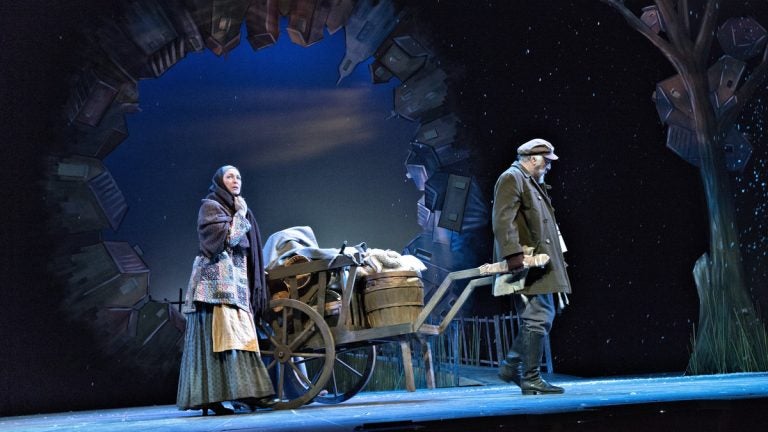Review: The universal ‘Fiddler on the Roof’

Joe Vincent as Tevye and Anne Kanengeiser as his wife in the Pennsylvania Shakespeare Festival production of "Fiddler on the Roof." (Photo courtesy of Lee A. Butz)
On the same day, Friday, that news outlets were showing images of some of the half-million Iraqis fleeing Mosul after Islamic extremists overtook the city, the Pennsylvania Shakespeare Festival opened its season with a genuinely affecting “Fiddler on the Roof.” That show – sweet and smart and tremendously unsettling – is now 50 years old.
And also as current as today. “Fiddler on the Roof” is set about 110 years ago in a village in Russia called Anatevka, and although the town is fictional, the events in the play are real. They lead to the now-iconic scene when the Jewish community of Anatevka is effectively destroyed as the increasingly violent Tzar’s soldiers order all the Jews out.
In “Fiddler,” the characters hastily arrange the places they’ll go, to relatives in America or to other places around the globe, hoping they’ll be welcome. The destination this week for the people of Mosul is less clear. The Iraqis leaving their lives behind them appear to be heading to Kurdish territory in the north, and hoping they’ll be welcome.
There are sunsets. And there and are sunrises. The wedding scene in “Fiddler” with the song about this unending transition is a lustrous moment in the Shakespeare Festival production. The overall sunset for the characters of Anatevka comes when they no longer have homes or lives they can recognize. The sunrise comes after the musical’s story, maybe long after, and I am an example of it: a Jewish American of Eastern European descent, sitting here writing to you now.
“Fiddler,” on the surface about Jews, really applies to anyone forced into wandering. Given that theme, it’s astonishing that the show manages to be so endearing and such fun – chalk that up to the stories by Sholem Aleichem, the Yiddish writer from Ukraine who captured Jewish life in Europe’s shtetls, the little villages where Jews lived for centuries in mostly self-imposed isolation from the larger world. Aleichem know how to tell ’em, and Joseph Stein knew how to adapt them and Jerry Bock and Sheldon Harnick knew how to set them to music, which is how “Fiddler” became a stage show.
The story of Tevye the milkman, his wife, and their five daughters has many signature scenes: among them the aforementioned wedding between a young tailor (Hunter Ringsmith) and the eldest daughter (Jennifer Apple); a Sabbath prayer with the extended family gathered around; a dream sequence with a threatening long-gone relative (Valerie Berger), and a wedding dance that is superb here in Stephen Casey’s recreation of the original choreography.
Joe Vincent, as much a Shakespearean actor (he’s been in all but four of the Bard’s 37 plays) as he is a musical theater performer, is everything a Tevye should be – put-upon, pensive and soul-searching, outspoken, strong when necessary and weak when facing up to his wife (Anne Kanengeiser, such a one-dimensional scold in her interpretation that she lacks a trace of maternal instinct). Vincent acts with his eyes as much as his brain. As the show moves forward, he becomes more and more a force on stage.
The production by Dennis Razze, the Festival’s associate artistic director, is an overall success, with some dents along the way. It stalls in the beginning, especially when Tevye performs the first part of “If I Were a Rich Man” – a solid introduction of his character – as he sits on his milk cart. This is a grand exposition, hardly a call for static staging, and you wonder if the guy will ever rise. (He does, far too late.) An early scene with the matchmaker, Yenta, is hard to make out because Patti Mariano plays her, oddly, with the show’s only Eastern-European accent, if that is what it is.
In fact, the production begins to purr when Tevye and the butcher Lazar Wolf (the excellent John Ahlin) come together at a tavern to talk of an arranged marriage – a scene that ends with the winning song “To Life.” The perfectly paced scene changes the tone of the production and accelerates its beat. From then on, this “Fiddler” is constantly on the move.
The Festival production boasts a huge ensemble of dancers, and a wide-ranging number of other fine performances and voices here – Leah Scofield and Christine Baglivio as two other daughters, Jonathan Raviv and Matt Kleckner as the men they eye, and others in supporting roles.
The 16-piece pit orchestra, led by Nathan Diehl, is a large part of the production’s success – and so is the flexible set design by Will Neuert. His Anatevka sprawls, with houses on trees ascending the sides of the stage, and in a circle that reaches its top to the rear. Sam Fleming’s costume design is handsome but some of it is hardly the clothes of peasants; in this Anatevka of old, it seems, there sits a Laura Ashley.
And last – but always – comes the fiddler who sits on a roof and plays. Here, he’s Louis Jannuzzi 3d, as a symbol of life’s precariousness, delivering a lilt one moment, a lift another and a looming note of warning that times will change, not always easily. Talk about universal.
_“Fiddler on the Roof” runs through June 29 at the Pennsylvania Shakespeare Festival on DeSales University Campus, 2755 Station Avenue in Center Valley, a few miles north of Quakertown. 610-282-9455 or www.pashakespeare.org.
WHYY is your source for fact-based, in-depth journalism and information. As a nonprofit organization, we rely on financial support from readers like you. Please give today.




